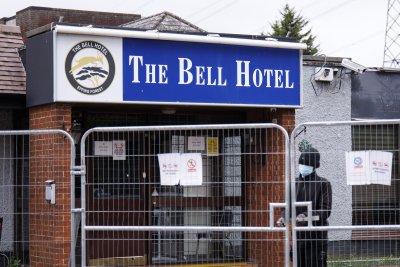
An August 2025 picture of a worker looking out from behind a gate outside Britain’s Bell Hotel in Epping, Essex. Asylum seekers will now be permitted to stay in the Essex hotel following Britain’s high court ruling against the local municipal council to remove them. Photo Provided by Tolga Akmen/EPA
Nov. 11 (UPI) — Asylum seekers will be permitted to stay at hotel in Essex following a British high court ruling against a local council to remove them.
The Bell Hotel in Epping Forest, less than 20 miles northeast of London, has housed roughly 140 migrants in the process of seeking British asylum. But the local Epping Forest District Council sought to block their temporarily living conditions after a 14-year-old girl was sexually assaulted and a man living in the hotel accused of the attack.
On Tuesday, Justice Tim Mould dismissed the council’s claims and ruled that an injunction was “not an appropriate means of enforcing planning control.”
Epping Forest’s councillors argued the Bell Hotel owner flouted local planning and zoning rules.
“What we saw in court was an unholy alliance of lawyers for government and big business intent on protecting huge profits and an indefensible asylum policy,”Ken Williamson, a member on Epping Forest District Council, told the BBC.
In August, a temporary injunction was awarded that banned asylum but later overturned by an appeal court following intervention by Britain’s Home Office.
Protests near the hotel turned violent in July when hijacked by far-right supporters after Hadush Gerberslasie Kebatu, an Ethiopian national and resident of the hotel, was charged with the teen girl’s sexual assault.
But Mould on Tuesday rejected the prospect that hotel owner Somani Hotels demonstrated a “flagrant or persistent abuse” of planning control with a growing number of immigrants and other foreign asylum seekers.
“Taking a broad view, the degree of planning and environmental harm resulting from the current use of the Bell is limited,” he wrote in a 87-page ruling.
The judge acknowledged the “criminal behavior of a small number of individual asylum seekers” housed at the hotel had “raised the fear of crime” in the local community.
It was noted there was a “continuing need” to house asylum seekers with a looming asylum hearing. And so that Home Secretary Shabana Mahmood “can fulfill her statutory duties.”
Tuesday’s ruling continued that statutory procedures under British law provided for the “local planning authority, or on appeal the Secretary of State, to determine conclusively whether an existing use of land is lawful because it does not involve development.”